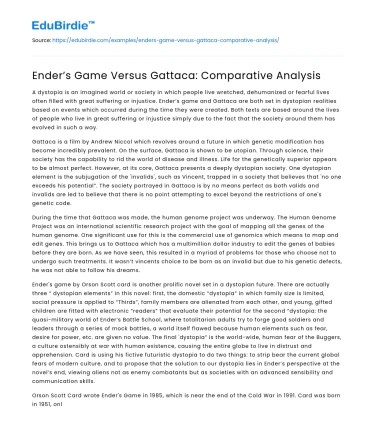A dystopia is an imagined world or society in which people live wretched, dehumanized or fearful lives often filled with great suffering or injustice. Ender’s game and Gattaca are both set in dystopian realities based on events which occurred during the time they were created. Both texts are based around the lives of people who live in great suffering or injustice simply due to the fact that the society around them has evolved in such a way.
Gattaca is a film by Andrew Niccol which revolves around a future in which genetic modification has become incredibly prevalent. On the surface, Gattaca is shown to be utopian. Through science, their society has the capability to rid the world of disease and illness. Life for the genetically superior appears to be almost perfect. However, at its core, Gattaca presents a deeply dystopian society. One dystopian element is the subjugation of the 'invalids', such as Vincent, trapped in a society that believes that 'no one exceeds his potential”. The society portrayed in Gattaca is by no means perfect as both valids and invalids are led to believe that there is no point attempting to excel beyond the restrictions of one's genetic code.
Save your time!
We can take care of your essay
- Proper editing and formatting
- Free revision, title page, and bibliography
- Flexible prices and money-back guarantee
During the time that Gattaca was made, the human genome project was underway. The Human Genome Project was an international scientific research project with the goal of mapping all the genes of the human genome. One significant use for this is the commercial use of genomics which means to map and edit genes. This brings us to Gattaca which has a multimillion dollar industry to edit the genes of babies before they are born. As we have seen, this resulted in a myriad of problems for those who choose not to undergo such treatments. It wasn’t vincents choice to be born as an invalid but due to his genetic defects, he was not able to follow his dreams.
Ender's game by Orson Scott card is another prolific novel set in a dystopian future. There are actually three “ dystopian elements” in this novel: first, the domestic “dystopia” in which family size is limited, social pressure is applied to “Thirds”, family members are alienated from each other, and young, gifted children are fitted with electronic “readers” that evaluate their potential for the second “dystopia: the quasi-military world of Ender’s Battle School, where totalitarian adults try to forge good soldiers and leaders through a series of mock battles, a world itself flawed because human elements such as fear, desire for power, etc. are given no value. The final 'dystopia” is the world-wide, human fear of the Buggers, a culture ostensibly at war with human existence, causing the entire globe to live in distrust and apprehension. Card is using his fictive futuristic dystopia to do two things: to strip bear the current global fears of modern culture, and to propose that the solution to our dystopia lies in Ender’s perspective at the novel’s end, viewing aliens not as enemy combatants but as societies with an advanced sensibility and communication skills.
Orson Scott Card wrote Ender's Game in 1985, which is near the end of the Cold War in 1991. Card was born in 1951, only four years after the beginning of the cold war. This means that Card was raised in not only the fear of the cold war but also lived in an age where an emphasis was always put upon scientific accomplishments. It is easy to see this reflected in his fiction. ender's Game takes place in Earth's future, one in which all countries are cooperating together to save the planet from alien invasion. Nevertheless, the novel does suggest that the international conflicts of the twentieth century will not be forgotten, as an American hegemony will be pitted against a Second Warsaw Pact, led by the Russians. In this world, Russia rules Eurasia from the Netherlands to Pakistan. Peter believes that Russia is preparing for a 'fundamental shift in world order.' Once the bugger wars are over, the North American alliances will dissolve, and Russia will take over. This conflict may have seemed inevitable in the early and mid-1980s, when the novel was written.






 Stuck on your essay?
Stuck on your essay?

